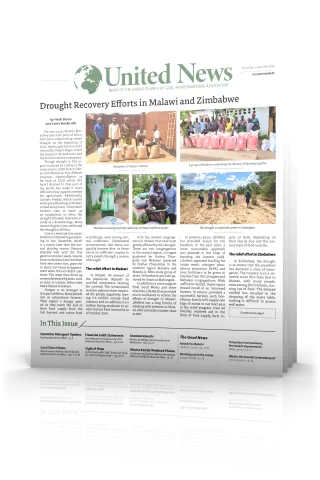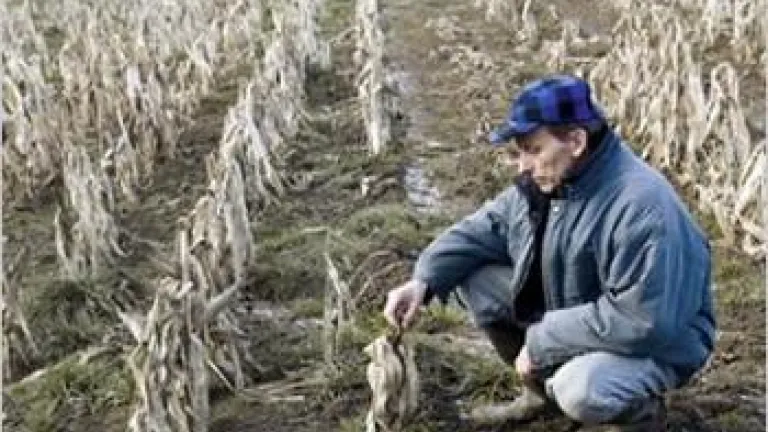Drought Recovery Efforts in Malawi and Zimbabwe

Updates on the drought situation in Malawi and Zimbabwe.
For over a year, Malawi, Zimbabwe and other parts of Africa have been experiencing severe drought. At the beginning of 2024, the drought became more noticeable. People began to feel the impact of delayed rains, and the brethren were no exception.
Though drought in this region is caused by a delay in the rainy season, other factors likely contributed to this difficult situation. Hyperinflation, as far back as 2020, which still hasn’t drained in that part of the world, has made it more difficult to buy supplies needed for agriculture. Additionally, Cyclone Freddy, which caused widespread flooding in Malawi, ruined many crops. It has taken farmers time to catch up on production, so when the drought followed, they were already at a disadvantage. Many meteorologists have attributed the drought to El Nino.
Due to a very late rain onset, brethren in Malawi began planting in late December, which is a month later than the normal planting season. Farmers typically wait until the first good rain to plant seeds. Several times in the year 2024, brethren have seen some rain, gone out to plant, but faced disappointment when the rain didn’t continue. The crops then dried up or were destroyed by pests, such as mice or insects, before they had a chance to mature.
Hunger is no stranger to this part of Africa. Many people live as subsistence farmers. They expect a hunger period as they reach the end of their food supply from the last harvest, and ration food accordingly, even during normal conditions. Unexpected circumstances like these can quickly become dire, as there exists no sufficient surplus to carry people through a season of drought.





The relief effort in Malawi
In Malawi, 80 percent of the population depends on rain-fed subsistence farming for survival. The inconsistent weather patterns have impacted the people negatively, leaving 5.6 million acutely food insecure and an additional 5.4 million facing moderate to severe chronic food insecurity as of October 2024.
UCG has several congregations in Malawi that have been greatly affected by this drought. There are two congregations in the central region, Lilongwe
(pastored by Haiton Thungula) and Nkhwazi (pastored by Cephas Chapamba). In the southern region Blantyre and Mayaka (a Bible study group of about 30 brethren) are both pastored by Gracious Mpilangwe.
In addition to some support from Good Works and other charities, LifeNets has provided much assistance to relieve the effects of drought in Malawi.
LifeNets has a long history of working with brethren in Malawi, who currently number close to 250.
In previous years, LifeNets has provided maize for the brethren. In the year 2024, a more sustainable approach was planned in the hope of boosting the harvest yield. LifeNets approved funding for maize seeds, nitrogen phosphorus potassium (NPK) and urea fertilizers to be given to families from the Lilongwe and Nkhwazi congregations. With sufficient rainfall, these inputs should result in an increased harvest. In return, provided a successful harvest, each beneficiary family will supply two bags of maize to use next year in the relief program. Over 60 families received aid in the form of food supply, farm inputs or both, depending on their family size and the current state of food scarcity.

The relief effort in Zimbabwe
In Zimbabwe, the drought is so severe that the president has declared a state of emergency. The country is in a situation more dire than that in Malawi, with many people, even among the brethren, running out of food. The delayed rainfall has resulted in the dropping of the water table, making it difficult to access well water.
For UCG congregations in Zimbabwe, the entire country is pastored by Mabasa Chichaya. Membership is about 150 people. One of the regions hit hardest by the drought is the village of Chemba. The area is difficult to reach, especially in the rainy season, when transportation is very difficult. The area has sandy soil, which makes it especially difficult for brethren to grow crops there.
Good Works has provided much of the aid for brethren in Zimbabwe. Even then, one difficulty that exists is that the banks and government in Zimbabwe often become suspicious when large amounts of money are transferred into the country, creating delays in delivering the aid. Thankfully, in the most recent funds transfer, God made the path very easy, as money was successfully sent and received in the same day.
The next step in delivering aid rests on the labor of love from pastor Mabasa Chichaya. He purchases supplies and, accompanied by one of the deacons, makes deliveries to the farthest reaches of Zimbabwe.
Some of the aid sent to Zimbabwe is used for seed, helping people gain independence in food production. An ongoing project is the drilling of borehole wells. These require heavier equipment than the tools farmers have available to drill their own wells. With the drop in the water table, even a 100 meter deep well needs to be doubled, in many cases, before one can access water. These projects are a great asset to individual families and their larger communities.

How you can help
As the situation unfolds, prayers are already beginning to be answered, as the beginning of 2025 saw some much-needed rainfall. In both Malawi and Zimbabwe, brethren wait prayerfully as their recently-planted crops begin to grow.
At this time, the most important way to help the brethren is through prayer, taking the situation to God, as He controls the rain. Pray for continued rainfall, so the new crops will grow without interruption. Pray for safe transportation and the successful transfer of funds as aid is delivered throughout the affected regions. And praise God for what He has accomplished in this situation so far!
We often wonder why these things happen, and why such dire circumstances affect our brethren. Although many factors are out of our control, God watches what we do in these situations. He observed not just those who are experiencing the trial, but those who are not. Do we watch from afar and say “God will take care of it” or do we reach out and do what we can, both financially as God has blessed us, and through our fervent prayers? Let’s remember our brothers and sisters!







